“The Drowned Cities hadn’t always been broken. People broke it. First they called people traitors and said they didn’t belong. Said these people were good and those people were evil, and it kept going, because people always responded, and pretty soon the place was a roaring hell because no one took responsibility for what they did, and how it would drive others to respond.” — The Drowned Cities, by Paolo Bacigalupi
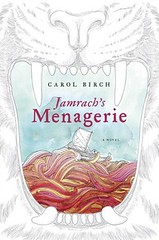 Jamrach’s Menagerie
Jamrach’s Menagerie
by Carol Birch
![]()
My book club selected Jamrach’s Menagerie as an “award-winning fiction” read. Knowing that it has been long-listed for the Man Booker prize and compared favorably with classics like Moby Dick, I read it eagerly.
Jamrach’s Menagerie is a novel about a 19th century London boy, Jaffrey, who survives a sea disaster. The novel is about friendship, growing up, adventure, love, survival, and coming to terms with grief. These are all profound subjects, and Jaffrey pulls you along with the story, as well as his thoughts, experiences, and emotions; sadly, though, of all the characters in the novel, Jaffrey’s is the only one that feels fully developed.
Is the novel as portentous as some reviewers say? I did not think so. As stories of endurance and survival go, Jamrach’s Menagerie doesn’t stand out in any particular way. Nor is it another Moby Dick, or even a Life of Pi. A character named Dan hunts an almost mythical animal, yes, but there’s nothing metaphysical about his quest. He’s no Ahab … he’s more the Marlin Perkins type, in it for the money and the fame. None of the characters on the whaling ship come up to the level of the crew on the Pequod, not even mad Billy Skipton with his curse of second sight. As for Jaffrey himself, he is just a boy. He is happy, sad, hungry, filled with wonder, filled with sadness … and that’s as profound as it gets.
Carol Birch writes beautifully but anachronistically. While Carol’s 19th century London is carefully drawn, Jaffrey and his friends talk to themselves and others in a breezy, contemporary way. I don’t think it’s necessary to have characters think and speak in stilted language in order to place a narrative in times past — Patrick O’Brian certainly didn’t do that in his brilliant Aubrey/Maturin historical novels — but Jaffrey’s manner of speaking just doesn’t jibe with the story’s historical setting. I haven’t seen any other reviewer comment on this, so maybe I’m being too critical.
Carol Birch tells a satisfyingly good but not particularly profound story, and I’m going to have a hard time coming up with anything terribly meaningful to say about her novel at the book club meeting.
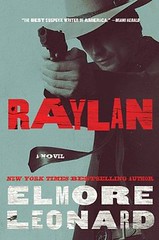 Raylan
Raylan
by Elmore Leonard
![]()
This will be a short review. I fell in love with Leonard’s crime fiction years ago; his intelligent and slightly crooked protagonists, his realistically stupid criminals, and mostly his true to life dialog … way he writes, slouchy and cool … and of course I am a huge fan of the TV series Justified, even though Timothy Olyphant looks nothing like the Raylan Givens I met in earlier books. But (you knew there was a but coming the moment you noticed I’m only rating this novel three stars): Raylan seems more a collection of written-for-TV scenes, teasers, and trailers, stitched together at the behest of the series’ financial backers, not a stand-alone novel. Actually I think Leonard moved on from Givens a while back, and doesn’t really have his heart in the character now. So … a good and entertaining read, but not prime Elmore Leonard. If you just can’t get enough of the TV series and have to have more, by all means read Raylan.
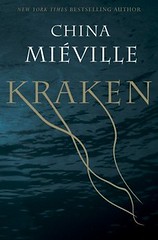 Kraken
Kraken
by China Miéville
![]()
I stopped rating unfinished books, so no stars … it wouldn’t be fair. This book is by no means a piece of crap; it’s just not my thing. Fans of fantasy will probably like this novel, so take my fantasy-phobic comments with a grain of salt.
I get antsy and impatient around fantasy. In fact, I’ll pat myself on the back for making it to the half-way point of Kraken before setting it aside (it’s a big book, so there). Kraken is about old gods surfacing in modern London, roiled up by a squid-shaped disturbance in the force. In outline it is similar to Neil Gaimin’s fantasy novel American Gods, which I did manage to finish. The difference is that Gaiman knows when the reader has had enough, and gets on with the story. Miéville is unconcerned with his readers’ patience; he overwhelms with detail, repetition, and more gods than God could keep track of. Halfway through I had totally lost track, and seeing as how Miéville was nowhere near finished throwing new gods at me, I put the book down.
Kraken is just too densely, obsessively populated, and none of the beings and spirits populating it, and none of the things they do or have done to them have anything to teach us. Honestly, if I’d thought the book had the slightest thing to tell me about life, I’d have pressed on. I did like Goss and Subby … well, “like” is not the right word. Let me just say that I will not forget them soon.
I’ve read two other novels by China Miéville (both reviewed on Goodreads, along with the Gaiman novel): I enjoyed The City and the City, though the preponderance of voweless, oddly accented, wholly invented Balkanesque words made it difficult to read. Perdido Street Station was more to my liking. Both of these novels had improbable, fantastic story lines, but though each contained elements of fantasy they were primarily science fiction, and thus possible. I’ll stick with Miéville’s science fiction … he tells fascinating stories, though I must say his characters always feel a bit contrived, not quite human … indeed, Miéville’s characters in general are alien. But he’s good. Will I read more science fiction by Miéville? Yes. Fantasy? No, not after this.
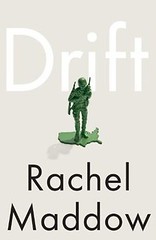 Drift: The Unmooring of American Military Power
Drift: The Unmooring of American Military Power
by Rachel Maddow
![]()
Here’s a short review sent to me by a former squadron-mate, a staunchly-conservative Republican and retired USAF officer:
“I’m almost finished reading Rachel Maddow’s book, ‘Drift’. It’s funny, irreverent, and amazingly naive about the nature of combat and how asymmetric warfare works. Her interpretation of how the Cold War went down is appalling, and it appears she never heard of McMasters’s ‘Dereliction of Duty.’ Still, when she turns her attention to the privatization of the Department of Defense, she raises a whole host of valid concerns. I wish she had footnoted her work, especially in the last half of the book. I highly recommend. And that is saying something as I normally shitcan polemics.”
Had this book been written by anyone else on the political left, my friend would never have read past the first chapter. He would have called it trash and dismissed it out of hand. But Rachel Maddow has an effect on people … she can get through to them. In that light, my friend’s review is extraordinarily positive.
True, Rachel pretty much distills the Cold War down to a brief discussion of the doctrine of mutual assured destruction. But the Cold Was is not her topic. Drift is about Congress relinquishing the constitutional prerogative to declare war, and the handing over of that power to an increasingly powerful president. Drift is about the way modern presidents have learned to maintain a state of perpetual war with minimal impact on the domestic life of American civilians, and how the military experience and the personal impact of fighting wars is now utterly alien to 99% of the country. Drift is about, as my friend points out, the privatization of many military functions, and the lack of accountability when private contractors violate the laws of war.
I think where Rachel is naive is in her conclusion, where she Pollyannishly imagines the possibility of turning this state of affairs around. Oh, no, that ship sailed a long time ago. Even as early as 1961, when Eisenhower warned us in his farewell speech of the dangers of an entrenched military-industrial complex, it was probably too late. I have a 46-year-old son. Our country has been at war, in one way or another, in one location or another, most of his life. I have a 10-year-old grandson. Our country has been at war his entire life, and it looks to stay that way. Rachel, I wish you were right, and maybe you are … in the alternate universe next door.
You look at other reader reviews and you’ll see nearly universal praise for Rachel’s arguments. She is able, as with my conservative friend, to make arguments that convince, or at least make people think. And a hell of a lot of people are reading Drift, and they’re engaged and thinking about the issues she raises. I too normally cosign polemics to the shitcan, because normally it’s nothing more than preaching to the choir, whether it’s Glenn Beck talking to the idiots in the Tea Party or Bernie Sanders making a speech to progressives in New England. But Rachel, she punches through our epistemological bubbles. This book is smart, it’s convincing, it has important things to say, it’s fun to read … and it could make a difference.
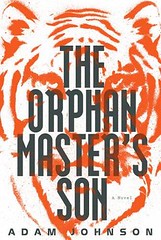 The Orphan Master’s Son
The Orphan Master’s Son
by Adam Johnson
![]()
I’m fascinated by North Korea and have read several non-fiction books about the country, its history, the lives of the people who live there, and the Kim regime. Some of these works were scholarly, some were journalistic and deliberately sensational; I’ve always suspected conditions there are far worse than anyone is letting on. Still, it’s hard to believe life in the DPRK is as grim as Adam Johnson depicts it in this novel.
But Johnson may have it right. Things may be even worse there than we know. Certainly, the cartoonish propaganda and bellicose rhetoric that emanates from the north would indicate so. Certainly, refugees’ tales of privation, rigid social control, and prison camps would indicate so. So I’ll give Johnson the benefit of the doubt.
As for the novel itself, it’s a hell of a read, horrific and spellbinding at once. Johnson puts his main character, Pak Jun Do (did he really mean that name to make us think of John Doe?) at the center of some of the main currents of what little we know of life, society, and politics in NK: he is an inmate of an orphanage, then a tunnel rat who digs in the dark beneath the DMZ, then a kidnapper plucking targets from coastal cities in Japan, then a radio surveillance operator on a fishing boat, then a member of a diplomatic team sent to Texas, then a prisoner digging up uranium with his bare hands in one of NK’s most (but not THE most!) brutal camps, then a member of the Dear Leader’s inner circle, then once again a prisoner in a torture center that will make you think of Winston Smith, O’Brien, and Room 101.
Yes, it’s all too incredible, all too convenient. But the only other way to tell the story of North Korea would be to write a scholarly work which no one but me would read. To novelize it, you need a character or characters placed at important junctions, and Pak Jun Do serves that purpose.
The novel is filled with incidental details of life in the DPRK. The loudspeakers. The tricks the regime uses to get neighbors and workers to denounce one another. The doubling up on workers for every task, the better for one to spy on the other. The use of families as hostages to keep fishermen from defecting. The pervasiveness of prison camps. The interrogators with their flat-top haircuts. The decayed infrastructure and darkness at night. The picked-over landscape with barely a scrap of food anywhere. And worse, much worse.
The action is almost non-stop. It’s physical, brutal, realistic. It’s also mental and spiritual. This is as much a novel of the mind and spirit as it is an action thriller and mystery. It is also damn well written. You just have to buy the premise, and Johnson does his best to see that you will by making Pak Jun Do a believable character.
Even if you are uninterested in North Korea, indifferent to the plight of the people trapped there, you will appreciate this book as a taut thriller, filled with cliffhangers and narrow escapes. I read it tensely perched on the edge of my seat, and I doubt you’ll be able to put it down either. Anything more I could say would be a spoiler, but it’s hard to hold back … this story is meant to be shared. Do read it.
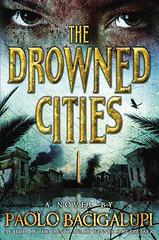 The Drowned Cities (Ship Breaker #2)
The Drowned Cities (Ship Breaker #2)
by Paolo Bacigalupi
![]()
The physical world is oppressively present in Bacigalupi’s fiction, as it is in Margaret Atwood’s dystopian novels (Oryx and Crake; The Year of the Flood): a world changed for the worse by global warming, with island nations wiped out and coastal areas no longer habitable; a world further ruined by human shortsightedness, where genetically engineered plant viruses introduced into the environment by agricultural conglomerates in order to wipe out competitors’ crops have made grain more valuable than oil; a world where warlords use child soldiers to fight over salvage rights in the ruins of once-great cities. And yet there are hints that somewhere in the world pockets of educated and wealthy civilization remain, and Bacigalupi’s outcast children — yes, much of his writing is directed at a young adult audience — see that as their city on the hill, and try to escape their desperate circumstances.
Katniss, you pussy, you have it easy compared to Mahlia and Mouse. At least Panem has a government. Imagine Joseph Kony and an army of drugged boys occupying half of what was once Washington DC, now partially submerged, the upper floors of buildings rising above the brackish water. Imagine the Taliban occupying what remains. Imagine being a child in such an environment, abandoned, outcast, prey for human enemies — not to mention genetically engineered coywolves hunting in packs.
I really should list this as a banned book and beat the rush, because when overprotective parents who challenge books like Lord of the Flies and The Hunger Games see the darkness here, they will surely put The Drowned Cities on their target list. Dark? Black … and yet there is a ray of hope, if you squint hard enough, and better yet, the promise of sequels.
And what a story! Like most good YA novels, this one will have you on the edge of your seat from beginning to end. It is pure hair-raising yarn, with action that never stops. I swear, I was panting by the end. Paolo Bacigalupi is wicked good.
Re: “Drift”
Rachel does stir the pot, and in my estimation, that’s good.
Re: “Drift”
Rachel does stir the pot, and in my estimation, that’s good. I laughed when you described me as a “staunchly-conservative Republican”. My conservative friends describe me as being a closet liberal. I like to think of myself as a Harry Truman Democrat who was mugged by reality. When it comes to politicians of all stripes, I am a skeptic who expects politicians to act like politicians, and our main problem is lack of leadership.
I’m reading a biography of Albert Camus and ran into a great quote. “Politics and the fate of mankind are shaped by men without ideals and without greatness. Men who have greatness within them don’t go in for politics.” He wrote that in 1937. Strange that he missed FDR, Churchill, and, yes, de Gaulle. (I like to throw Charlie in – it upsets folks. But he does qualify.)
I’ve just finished Crumpton’s “The Art of Intelligence”. His time lines are in sync with other sources, and I highly recommend.